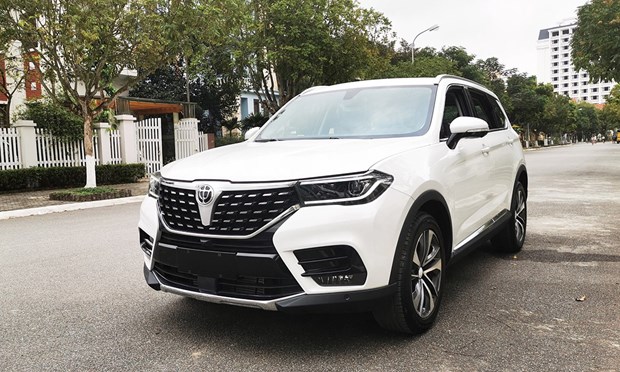 Economy
Economy


|
| A Chinese-manufactured car in Việt Nam. The diversity of products and energy sources offered by Chinese car brands can provide more options for consumers. — Photo vietnamplus.vn |
HÀ NỘI — The entry of Chinese automakers into the Vietnamese auto market presents both opportunities and challenges for consumers and competitors in Việt Nam, according to local car experts.
The diversity of products and energy sources offered by Chinese car brands can provide more options for consumers, and the introduction of electric vehicle models aligns with the global trend towards sustainable transportation.
However, Chinese car brands face certain obstacles in overcoming consumer prejudices and skepticism towards their quality, technology, and competitive advantages. This is not the first time Chinese automakers have entered the Vietnamese market. Between 2007-2009, the Vietnamese auto market saw the entry of Chinese brands like Lifan and Chery. However, experience with these two brands left consumers with concerns about the quality, design, and safety of Chinese cars, according to car expert Nguyễn Thế Đạt from CARTIMES, a specialised page of the Industry and Trade magazine.
The arrival of Chinese cars in Việt Nam with attractive designs and trending technology has created competition between domestic and foreign car makers. Automobile companies in Việt Nam should improve product quality, reduce costs and enhance services to compete with rivals to promote the development of the Vietnamese auto market.
They should strive to match the safety, reliability, and technological advancements offered by established car brands from countries like Japan, Germany, South Korea, and the US, which are highly valued by Vietnamese consumers. By doing so, Chinese automakers can build trust and credibility in the market and contribute to the development of Việt Nam's automobile industry.
Nguyễn Tuấn of Thiên An Phúc Company, a car trading company, said that because of the poor reliability and brand reputation of Chinese cars, many newly-used Chinese cars often drop in price sharply and are difficult to resell, which is a concern for car buyers.
For electric vehicles (EVs), charging infrastructure and management of EVs quality are also important aspects that have not been well established by all auto makers.
In Việt Nam, VinFast auto maker has developed a charging station system with more than 150,000 charging ports nationwide. The rapid increase in the use of lithium-on batteries in EVs has garnered much attention, and VinFast has committed to be responsible for the end of the life of batteries, which includes remanufacturing, repurposing and recycling.
Since early this year, Chinese automakers have continuously launched new car models to the Vietnamese market aimed at affirming their position in one of the markets in Southeast Asia with the most potential.
Notably, MG, the British auto brand now part of Shanghai Automobile Industry (SAIC Motor), returned to the Việt Nam market via Malaysian distributor (Tan Chong Motor Holdings Bhd) in 2020. MG has opened dealerships in many provinces and cities. The company has also announced its plan to invest in an auto assembly plant in Việt Nam. However, car sales are still quite modest and the plan for the assembly plant is still on the table.
After returning to Việt Nam, since July 2023, SAIC Motor has set a goal of reaching sales of about 100,000 vehicles annually in the next five years with an aim of gradually acquiring a position as a top three best-selling auto brand in Việt Nam.
Other Chinese auto brands such as Hongqi landed in Việt Nam in early 2022 with models such as the H9 gasoline car and electric E-HS9. Haval, a subsidiary of Great Wall Motor Group, also opened a dealership and launched its first car model Haval H6 in August this year.
TMT Automobile JSC (TMT Motors) also launched its model Wuling Hongguang Mini electric vehicle in Việt Nam with a price ranging from VNĐ239 million to VNĐ282 million in June.
According to industry insiders, the competition of Chinese auto manufacturers with domestic and foreign car manufacturers will continue to make the Vietnamese auto market more diverse in terms of choices and prices. Clients will benefit from this competition; however, they need to be cautious and consider carefully before deciding to buy a car so as to ensure that they will receive the best quality and value for their choice. — VNS




